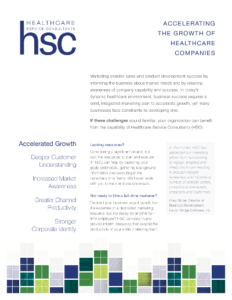
Many healthcare IT organizations look to outside marketing agencies. The goal is to get help creating and executing a strategic product marketing plan for awareness building and lead generation. Yet, several different engagement and pricing models exist. This can make comparing and identifying the one that will work best for your company (and budget) overwhelming and frustrating.
Common models include project, retainer, and programmatic approaches. In this blog, we’ll explore the pros and cons of each. We’ll also provide helpful tips on how to identify the model that will best fit your needs.
When to Choose a Project-Based Approach
Project-based engagements are short-term, fixed-fee contracts. They involve specific and pre-defined scope and deliverables. For example, developing a webinar or authoring a white paper. This approach works well when the organization has specific needs but lacks the internal resources to fulfill them. The benefits of this approach include:
Scope. In this model, the hiring entity defines deliverables and timeline. All parties have a clear understanding of what will be delivered and when.
Cost. Because the scope is well-defined, companies know the cost in advance. This makes it easier to fit into tight marketing budgets.
Complexity. Project-based engagements usually involve only one or two specific deliverables. Thus, they are less complex than longer-term product marketing agency engagements. They are easier and less burdensome to outsource.
To get the best results from a project-based approach, set aside time up-front to educate outside consultants. Namely, on the personas, problem statements, and value propositions of your specific company and products. To be most effective, this approach requires the organization to have a clear vision of how the new deliverables support its marketing goals. This is not always the case for young companies. Many times, they lack internal product marketing expertise.
What Is a Retainer-Based Approach?
Companies lacking internal marketing expertise may wish to engage in a longer-term, more strategic relationship with a marketing agency. Yet, they may not be able to articulate their strategy or goals. This type of engagement involves an up-front payment drawn against at an agreed-upon hourly rate. Consultants perform work on an ongoing basis. This approach is popular among legal and accounting firms. Often, there is ambiguity around goals and how best to get there.
Unlike a project-based approach, retainer contracts establish a longer-term commitment. This allows for a deeper and more embedded relationship. But, retainer contracts often do not define the specific activities or deliverables involved. A level of ambiguity can be complex and difficult to manage for smaller organizations. They may lack the time or expertise to manage and oversee a retainer engagement.
Benefits of a Programmatic Approach
A programmatic approach combines project and retainer-based characteristics. It creates a model that is both strategic and well-defined. As with a project-based approach, the consultant and client spend time up-front defining the activities and deliverables involved. But, over a 6–12-month time horizon.
Like a retainer model, the product marketing agency should become more embedded in the client’s business. This enables a better understanding of the company’s:
- brand
- direction
- products
- value propositions
The financial structure mimics a subscription model. Scope of work determines fees, which are often paid in equal monthly installments. It is an excellent model for all parties for many reasons. Strategic objectives are clear, but the tactics required to accomplish them are somewhat vague. This enables tactics to evolve as all parties learn what the business needs. Benefits of this model include:
Clarity. There is a clear understanding of the deliverables, timeline, and cost. This makes planning and budgeting easier.
Relationship. The product marketing agency becomes embedded in the client’s business. They understand the company’s needs, products, sales challenges, value propositions, etc. Thus, they are better able to partner with the client.
Flexibility. There is an up-front effort to define some level of tactics. But, the specific approach and deliverables can be flexible. That is, provided the changes do not significantly alter the scope of work.
Important Considerations for a Successful Programmatic Engagement
It is important to remember one thing. What you get out of a product marketing consulting engagement, regardless of the model, relates to what you put into it. Like onboarding a new employee.
Expect to spend time with your consultant throughout the engagement. You will need to educate them about your business, successful sales strategies, competitive learnings, and evolving challenges. Only then can they provide valuable recommendations that inform your overall go-to-market strategy.
It is also essential to consider who brings an external marketing agency into the company. For a project-based approach, it might be adequate for a product marketing manager with a specific deliverable in mind (e.g. a white paper). But, for a programmatic approach, senior-level representation needs to have input. They must expose the consultant to the higher-order, strategic thinking of the organization. Doing so enables them to better align the strategic goals of the business. And be better positioned to contribute to the company’s success.
We Can Help You Make the Right Choice for Your Business
Are you looking to augment your team with deep healthcare IT product marketing expertise? HSC often engages with clients via the programmatic model due to its inherent long-term benefits. But we can also deliver discrete projects on an individual basis. Talk with our product marketing experts to determine which approach will achieve your business goals. Contact us to learn more.




